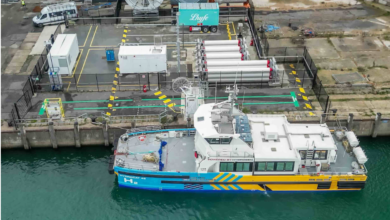Consortium to study commercial-scale hydrogen imports to Europe
SPERA Hydrogen is expected to play a key role in the commercial-scale hydrogen supply chains globally as it uses existing infrastructure and vessels and is easier to handle.

A consortium consist of Port of Rotterdam Authority, Koole Terminals, Chiyoda Corporation and Mitsubishi Corporation have agreed to conduct a joint study to assess the feasibility of importing hydrogen on a commercial scale to the Netherlands.
The partners will study hydrogen imports from abroad to one of Koole’s terminals in the port of Rotterdam, employing SperaHydrogen (Chiyoda hydrogen storage and transportation technology). The feasibility study is expected to take one year. The aim is to import 100k to 200k tonnes/year hydrogen in 2025 and 300k to 400k tonnes/year in 2030.
The Port of Rotterdam Authority will provide a matchmaking role for major hydrogen end-users in Northwest Europe and overseas hydrogen suppliers and support for materialising the project. Koole Terminals will explore ways to innovate its terminal facilities and develop onward transport to their end-users. Chiyoda Corporation will offer its SperaHydrogen technology, and Mitsubishi Corp will lead the project’s commercial development, making the hydrogen supply chain commercially viable.
The Port of Rotterdam explores ways to develop new hydrogen supply chains from countries where hydrogen can be produced and supplied cost-effectively to Northwest Europe to help the region become carbon neutral. The Port of Rotterdam Authority supports companies such as Koole Terminals, which are keen on developing hydrogen business through their existing facilities or building new ones.
Shipping hydrogen is a complex process and can be transported to convert it to liquid by a cryogenic process to minus 253 degrees; transform it into a carrier, like ammonia or methanol; or chemically combined in a so-called liquid organic hydrogen carrier (LOHC).
LOHC is an organic compound that can absorb and release hydrogen through chemical reactions. Methylcyclohexane (MCH) is a LOHC and is in a liquid produced from toluene and hydrogen, which can be in a liquid state from -130°C to 100°C, so can be handled as a liquid under ambient temperature and pressure. It maintains a stable liquid state under ambient temperature and pressure. In terms of risks, MCH is comparable with petroleum and petrochemical production in terms of the risks involved.
Chiyoda Corporation has developed the Spera Hydrogen technology to release hydrogen from MCH. When hydrogen is produced from MCH, toluene is released simultaneously and can be shipped back to be used as a raw material for making MCH again.
In 2020 Chiyoda Corporation, Mitsubishi Corporation and Mitsui & Co and Nippon Yusen Kabushiki Kaisha completed the demonstration project of the long-distance transportation (5000 km) and storage of hydrogen using Chiyoda Corporation’s Spera Hydrogen technology by producing MCH in Brunei, shipping it to Japan and shipping toluene back to Brunei. This was the world’s first global hydrogen supply chain project proving the technical readiness for commercial use.
